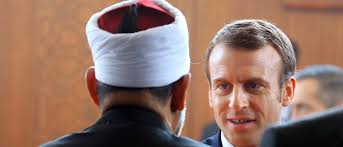How France’s deradicalisation hurts Muslims
The French government’s policy of ‘deradicalisation’ is sowing the seeds of hatred in wider French society, as the country’s Muslims have become usual suspects. Two hijab-wearing Muslim women were repeatedly stabbed in a park under the France’s symbolic Eiffel Tower on October 21. The attackers were two women of European descent. They reportedly shouted invectives […]

The French government’s policy of ‘deradicalisation’ is sowing the seeds of hatred in wider French society, as the country’s Muslims have become usual suspects.
Two hijab-wearing Muslim women were repeatedly stabbed in a park under the France’s symbolic Eiffel Tower on October 21.
The attackers were two women of European descent. They reportedly shouted invectives such as “dirty Arabs”; “go home to your own country,” while plunging knives into the victims’ bodies.
Confirming the incident, the French Police did not record it as a hate crime. The lawyer for the two victims however lodged a complaint, asking the authorities to investigate the incident as a hate crime in light of the racist slurs used by the attackers and “because the victims’ belonged to a specific race and religion”.
The lawyer, Arié Alimi, said the aggression faced by his clients is undoubtedly linked to their association with Islam, although the police initially dismissed that critical aspect of the case.
“It is to be feared that other acts of this type will take place,” he said.
The incident came almost a week after the gruesome beheading of a middle-school teacher, Samuel Paty, in Conflans-Sainte-Honorine. He was murdered in cold blood by a Muslim fanatic for showing controversial caricatures of the Islamic Prophet Muhammad in class. Fifteen people, including the suspect’s family members, were taken into custody.
For Yasser Louati, a Paris-based human rights activist and former spokesperson of Collective Against Islamophobia in France, the stabbing of Muslim women in a Paris park is yet another manifestation of the French government’s hasty and inadequate anti-radicalisation response that only fuels anger in the wider French society and causes retaliations against innocent Muslims.
As French Muslims have always felt wronged by the system and subjected to collective punishments for someone else’s crime, the backlash caused by the French teacher’s beheading wasn’t any different.
The French Interior Minister Geral Darmanin, in a tweet, called two Muslim NGOs, Baraka City and Collective Against Islamophobia (CCIF) as enemies of France, and called for their dissolution. Both organisations denied the claims of “condoning terrorism.”
Many other Muslim associations to which the government has previously granted subsidies, are now being targeted in a much wider crackdown against the entire Muslim community. For Louati, President Macron’s de-radicalisation response is like throwing “oil on fire” as it only leads to further exclusion of Muslims from French society.
Collective punishment
The French government has been criticised for its inability to strike a balance between counter terrorism and collective punishment of Muslim citizens in the past, too.
For instance, in 2015, the French Government adopted a nationwide state of emergency to track down and destroy the extremist networks in the country.
The move came in response to the terror attack on the offices of Charlie Hebdo, a satirical magazine which had published a controversial drawing of Prophet Muhammad. At least 12 people were killed in the attack, leaving the nation in shock.
The emergency law, which gave the police unbridled powers to arrest anyone on mere suspicion and raid private properties on a whim, was prolonged for several months. The police carried out nearly 3600 warrantless raids since the publication was attacked, while Islamophobic attacks on Muslims increased across the country. Out of those 3600 raids, only six led to terrorism-related criminal investigations.
Although the police response has largely been inconsiderate towards Muslim citizens, the people from the minority community have equally mourned the incidents like the beheading of the French teacher.
“There’s been a lot of vigils and commemorations for the teacher who was murdered and many Muslim teachers were attending these ceremonies for their colleague,” Nadine Sayegh, a Paris-based researcher specialising in Human Security and Countering Violent Extremism told TRT World.
“The real issue is unequal treatment in the punishment of such crimes,” she says, pointing out the government’s counter measures that almost always singles out the Muslim community.
For Louti, the process of marking Muslims out as usual suspects have snatched away their right to grieve along with their fellow citizens, as the feeling of mourning is often overshadowed by the feeling of fear. “You go to bed in shock, you sleep fearing the police at your door,” he says.
Group wants France’s anti-religion laws probed
The Council on American-Islamic Relations (CAIR) has called on the United States Commission on International Religious Freedom (USCIFR) to investigate the France’s ongoing campaign of “collective punishment” against the French Muslim community, as well as France’s longstanding history of turning anti-religious bigotry into government policy. (TRT World)
In the days since the horrific murder of educator Samuel Petty, CAIR said France has arrested numerous French Muslims with no apparent connection to the crime and threatened to shut down various French Muslim organizations, including the country’s largest anti-Islamophobia group.
In a statement, CAIR Government Affairs Director Robert S. McCaw said: “We encourage USCIFR to investigate and oppose the French government’s ongoing campaign of collective punishment, as well as its history of restricting freedom of religion: kicking students who wear crosses, kippas and hijabs out of school, barring public servants from wearing such signs of their faith, criminalizing religious face veils while requiring medical face masks, and arresting Muslim women for wearing full-body swimsuits at the beach, among other irrational policies.”
(TRT World)
